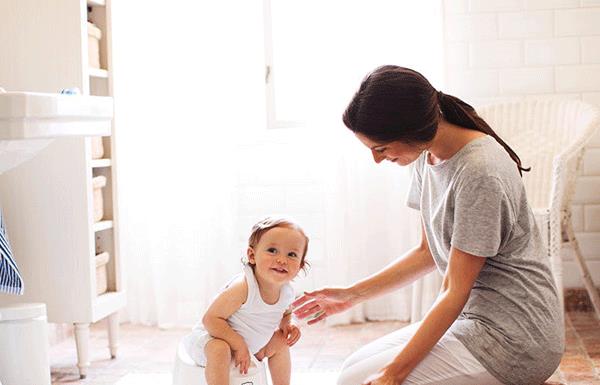Teaching the baby to potty initially will meet certain difficulties, even the "resistance" to the face of the little angel. However, before going to school, children must know how to sit by themselves.
content
Baby signaled
Realize that your baby wants to go to the toilet
Diapers are always dry
Introduce your baby to the potty like a new toy
Encouraged when the baby is potty
Let your baby do everything he likes
Praise more
If your baby is almost 2 years old and still has to befriend the diaper, remember that it will be time for you to think about potty training.
According to experts when the baby is 20-24 months old, it may take a little longer when the baby can go to the toilet by himself if he wants. Starting earlier than that is likely that parents will face a negative reaction from their child. Self-toileting is a milestone that marks the growing child , the real maturity compared to the beginning.
Of course, when your baby is ready, there are always clear signs. Note that babies under 1 year old or less than 15 months often don't have enough muscles and nervous systems to control their bowels and bladder, and it can be meaningless to practice babbling early.
If parents still try to force, be ready to accept the endless war with the baby. Maybe you will win, but it will push the child's psychology into more disgust and frustration at the thought of going to the toilet. Everything is only going smoothly when there is active cooperation between parents and children.

Teaching your baby to the potty is a battle that needs parents' endurance
Here are typical signs that your baby is ready to make friends - the potty:
Baby signaled
After the cradle ceremony, the baby has really entered a new milestone in his own development journey. At this point, your baby can show her wet or dirty diaper by talking or pointing. But baby learning to talk babbling unclear but obviously you can understand what your baby pet.
Realize that your baby wants to go to the toilet
This is a very positive sign. Your baby may already be aware that he is preparing to pee or pee. Your baby will look at the village with a serious expression or constantly move with discomfort.
Even though your baby has been wearing diapers for many hours, when you check you will always find that there is no moisture at all. This lasts for 3-4 hours and repeated the next day can be a sign that your baby is ready.
Remember that getting your baby acquainted with the potty doesn't always follow the plan you outlined earlier, nor does the information in a book. This exercise can challenge every parent's patience. Staying calm is the best way if your baby doesn't cooperate. Everything will be fine if the mother will listen to the baby more.
Your baby is not ready to potty yet, possibly because your baby hasn't learned bladder control even though his peers have had that skill for a long time. Or it is the tension between parents and babies that makes children feel uncomfortable.
Don't worry too much, be patient and here's what you can do best:
Introduce your baby to the potty like a new toy
By buying funny colorful and shaped pots you can explain to your child that from now on will be a new friend every time he goes to the toilet. Keep potty in a place where the baby is easy to see because no child will go looking for "strangers" when they are in "need of resolution"!
Encouraged when the baby is potty
Practice having your baby sit happily 2-3 times a day, especially 15-20 minutes after each meal. At first, of course, no child is comfortable, but then the baby will feel better.
Let your baby do everything he likes
In order for your child to really get to know the potty, let him do whatever he likes while sitting on the potty. That can be held with favorite toys, singing or playing with something. If your baby gets up too early, motivate him with some spot play to let him sit for longer.
Praise more
Don't forget to add compliments to your baby's first potty seats. Children going to be 2 also love to be praised for doing right. If the potty has gotten into orbit, give your baby a passionate hug.

How to react when 2 year old baby or screaming? Babies often scream not because they intentionally want to disturb you, but because they are full of great children's joy. Your baby is exploring the "power" of the larynx and testing what they can do with it.
Practicing a real potty baby is a difficult exercise for many parents, especially when the baby doesn't cooperate in the first place. But do not be discouraged, the 2-year-old milestone is when children need to master this skill to enter a more convenient kindergarten environment.













